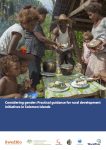 Story highlights
Story highlights
- Cultural as well as social norms and relationships between women and men underlie unequal access to benefits from livelihood interventions
- Development institutions have differing capacities to understand, challenge and transform gender inequalities in their programs
- Actively challenging and shifting norms and relationships underlying gender disparities could accelerate development investments and improvements to human-wellbeing
Achievements of livelihood development investments are limited by the presence of gender and social inequalities. Integration of gender considerations into livelihood development practice is a thematic area of work of a SwedBio-WorldFish supplementary livelihoods program in Solomon Islands and Timor-Leste in support of regional policy objectives for improved food security and incomes.
Integrating gender considerations in development practice
Past research conducted by WorldFish suggests that men are more able to benefit from development opportunities than women, as they tend to be in a better position to access and control productive assets (i.e. income, land, equipment, technology) and resources (i.e. education, information, extension services). In situations of low incomes and geographical remoteness the gap between women and men is greater, such as in many communities in Solomon Islands and Timor-Leste. Whilst WorldFish’s initiatives contribute to establishing nuanced insights on the different empowerment of women and men, considerable challenges remain in the translation of these insights into development practice.
To bridge this gap, members of National and Provincial Governments, NGO representatives, academic institutions, and community leaders in Solomon Islands and Timor-Leste were invited to attend workshops and share their experiences in working on livelihood initiatives. Understanding norms and relations generating inequalities is an important first step towards ensuring equitable participation and access to resources from development programs: attendees engaged in discussions about integrating gender sensitive considerations in local contexts.
“There is an imbalance between men and women participating in livelihood activities, and women’s participation is very small”
Workshop participant from the Ministry of Agriculture, Timor-Leste
The SwedBio-WorldFish partnership intends to recognise and address gender inequalities by employing a gender-transformative approach (GTA). A GTA actively seeks to challenge and shift norms and relationships underlying inequalities to accelerate development investments and drive improvements to human well-being.
Members of West Are’Are Rokotanikeni Women’s Association discuss the impact and longevity of past livelihood initiatives in their community at a workshop under the SwedBio-WorldFish partnership in Malaita Province, Solomon Islands
Gender transformation requires different approaches in different contexts
Different cultural and geographic realities shape gender dynamics, thus a GTA may entail different actions in different localities. Households in both Solomon Islands and Timor-Leste have a complex composition of subsistence, informal and formal livelihood activities depending on the surrounding environment: for example, coastal households in Solomon Islands are primarily dependent on subsistence fishing, while inland communities cultivate gardens for crops. This varied context defines differences in the roles and responsibilities of women and men, and their power and freedom to pursue livelihood alternatives to generate improved income and food.
Within these contexts, development institutions have differing capacities to understand, challenge and transform inequalities in their programs. Some initiatives deliberately sought to transform gender norms promoting inequalities, for instance through income-generating projects challenging traditional roles and responsibilities, or by encouraging recognition of women’s value in project-related decision-making processes. Other development interventions were instead unintentionally reinforcing or sustaining gender imbalances and inequalities, for example one participant reported:
“The marine management plans that we have implemented in the past have sometimes overlooked the role of women, or only seen fish species as important for men”
Workshop participant from the Ministry of Fisheries and Marine Resources, Solomon Islands
A learning journey from research to practice
The workshops in Solomon Islands and Timor-Leste under the SwedBio-WorldFish partnership build on work supported by ACIAR and CGIAR to promote the delivery of gender equitable livelihood development programs. Pursuing a GTA is a journey of learning as there is no exact formula for applying a GTA, and in some cases it may be difficult to foresee if initiatives are transformative. A new practical guidance manual summarizes lessons and insights from Solomon Islands to help development institutions build programs that are attuned to gender-transformative thinking and practice.
Article developed by Sarah Lawless and Hampus Eriksson.
For more information contact partnership leaders Hampus Eriksson at WorldFish (H.Eriksson@cgiar.org) or Max Troell at SwedBio (max@beijer.kva.se) or gender scientist Sarah Lawless (sarah.lawless@outlook.com).


 Read the new WorldFish Report: Considering gender - Practical guidance for rural development initiatives in Solomon Islands
Read the new WorldFish Report: Considering gender - Practical guidance for rural development initiatives in Solomon Islands